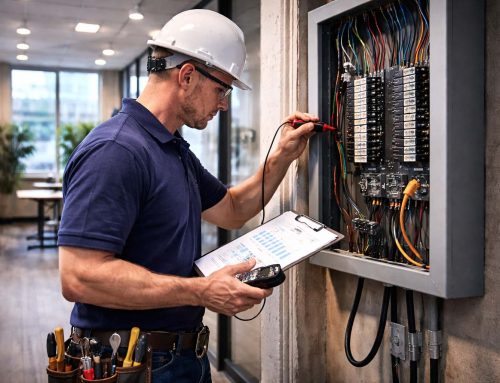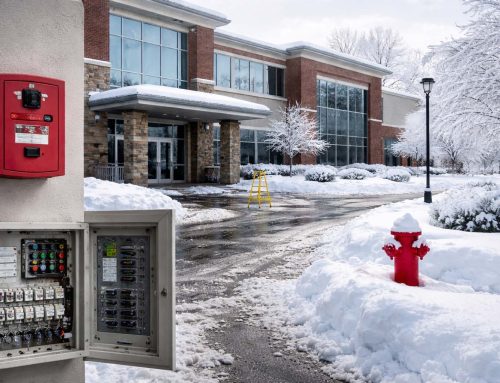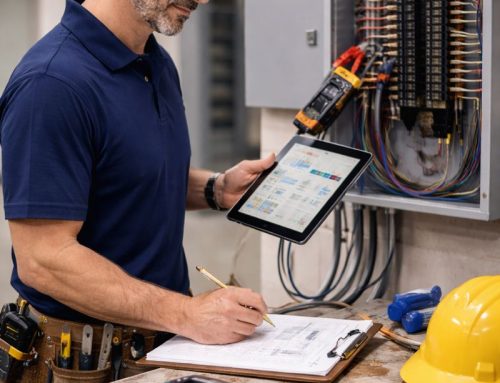In any commercial setting, the electrical system is the backbone of operations, ensuring that everything from lighting to machinery functions smoothly. However, when a breaker trips, it can disrupt business activities and cause significant inconvenience. Understanding why breakers trip is crucial for maintaining an efficient and safe electrical system. Here, we explore the common reasons behind tripped breakers and how to address them.
1. Overloaded Circuits
Cause: One of the most common reasons for a tripped breaker is an overloaded circuit. This occurs when too many devices draw power from the same circuit, exceeding its capacity.
Solution: To prevent this, distribute electrical devices across multiple circuits. An electrician can help assess your load requirements and reconfigure the circuit distribution if necessary.
2. Short Circuits
Cause: A short circuit happens when a hot wire (live) touches a neutral wire. This causes a surge of electricity that the breaker trips to prevent potential fire hazards and damage.
Solution: Identifying and repairing the source of the short circuit is essential. An experienced electrician can pinpoint the problem area, replace faulty wiring, and ensure all connections are secure.
3. Ground Faults
Cause: Similar to a short circuit, a ground fault occurs when a hot wire touches a grounded part of the system, such as the metal wall box or ground wire. This can be particularly dangerous in wet or damp environments.
Solution: Ground fault circuit interrupters (GFCIs) are designed to protect against ground faults. Installing GFCIs in areas like kitchens, bathrooms, and outdoor spaces can enhance safety. Regular inspections and maintenance can help detect and fix ground faults promptly.
4. Arc Faults
Cause: Arc faults result from loose or corroded connections in the wiring, causing intermittent electrical arcs. These arcs can generate significant heat, posing a fire risk.
Solution: Arc fault circuit interrupters (AFCIs) are specifically designed to detect and interrupt arc faults. Upgrading to AFCIs can provide an extra layer of protection against potential fire hazards.
5. Faulty Appliances
Cause: Sometimes, the issue lies not with the electrical system but with an appliance. Faulty appliances can draw excessive current or cause short circuits, leading to a tripped breaker.
Solution: Disconnect the suspected appliance and see if the breaker still trips. If it doesn’t, the appliance likely needs repair or replacement. An electrician can help assess the safety of your appliances and recommend necessary actions.
6. Old or Outdated Breakers
Cause: Older breakers may wear out over time, becoming more prone to tripping even under normal load conditions. Outdated breakers might also fail to handle modern electrical demands efficiently.
Solution: Upgrading your electrical panel and breakers to newer, more robust models can enhance the reliability of your electrical system. Regular maintenance checks can ensure your breakers are in good working condition.
Preventative Measures and Professional Assistance
To minimize the risk of tripped breakers, consider these preventative measures:
- Regular Inspections: Schedule regular electrical inspections to identify and address potential issues before they cause disruptions.
- Load Management: Ensure that electrical loads are well-distributed across circuits. Avoid plugging too many high-wattage devices into a single outlet.
- Upgrade Outdated Systems: If your electrical system is old, consider upgrading to meet current safety standards and electrical demands.
- Professional Maintenance: Enlist the help of a professional electrician for routine maintenance and repairs. Their expertise can ensure your system remains safe and efficient.
Conclusion
Breakers tripping can be a frustrating experience, but understanding the underlying causes can help you take proactive steps to prevent it. At Eric Gandler Development Electric, we specialize in commercial electrical solutions, ensuring your business operates smoothly and safely. Whether it’s diagnosing a tripped breaker or upgrading your entire electrical system, our team is here to help.
Contact us today to schedule an inspection or to learn more about how we can enhance the reliability of your commercial electrical system.
Read more about our services and expertise on our website. Let’s keep your business powered up and running efficiently!





